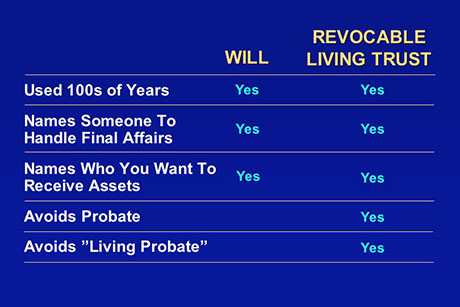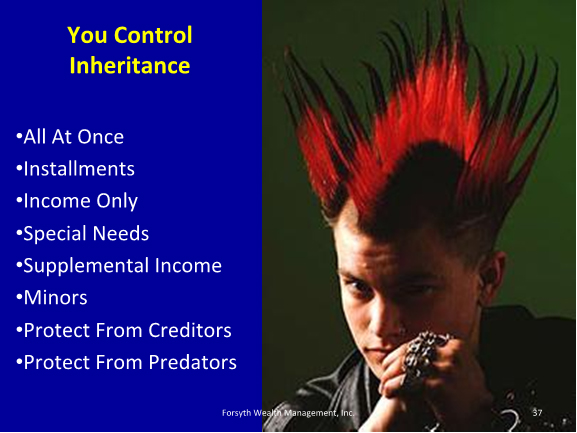Estate Planning
Estate Planning For All!
Estate planning is a term that has changed dramatically over the years. At one time, estate planning meant having a will that would go through probate and, if a person was married, titling property jointly with a spouse. You thought of things like wealth families, attorneys and inheritance.
It has been portrayed as a way that the wealthy plan so that they could avoid estate taxes. However, over the last twenty years, changes in the laws and changing views of finance, lifestyle, privacy, nontraditional families, and longevity of life have made estate planning far more necessary for a larger group of people than ever before.
The necessity of estate planning has now reached the little guy!
For decades, it has been debated which was more suitable for estate planning, wills and probate versus living trust centered planning. That argument has been settled. Most Americans now recognize that living trust–centered estate planning is more suited for the modern, mobile society in which we now live.
- Estate planning is no longer will planning or tax planning only for the wealthy.
- Estate planning is financial, retirement, business succession, charitable, medical, disability, legacy, and gift planning.
- And, although the federal estate tax has excluded a lot of individuals from its grasp, a new group of individuals have become ensnared with and estate tax at the state level.
People who live in states that have an estate tax with a low exemption, such as, New York and New Jersey, can be subject to state estate tax at very low thresholds.
For example, in New Jersey, anyone with an estate over $675,000 may be subject to pay estate taxes. And that does not include possible inheritance tax and probate. In New York, the exemption is $1,000,000.

Common Estate Plans
There Are Only Six Ways To Plan Your Estate
Having A Will
- Probate can be expensive, time consuming and public.
- Wills require a court process, can be expensive, time consuming and public and does not replace probate.
- And because a Will does not take affect until you die, it cannot help you when you are incapacitated. You must use a Power of Attorney, which can create different problems.
- If you can't conduct business due to mental or physical incapacity (for example, from Alzheimer's disease, stroke or heart attack) only a court appointee can sign for you -- even if you have a will.
Doing Nothing
If you have no estate plan -- not even a will -- when you die, your assets will be distributed according to the state's probate laws. And if you become incapacitated before you die, the court will probably take control of your assets. This is probably the worst situation because you will have NO control.
Using joint ownership
Some people think this will avoid probate and give them the control they want. However, owning assets jointly can cause other problems, too.
- It doesn't avoid probate -- it just postpones it.
- If you die first, you have no way of controlling what ultimately happens to the asset. You could unintentionally disinherit your own family.
- If your co-owner becomes incapacitated, you could find yourself with a new co-owner -- the court!
- Adding a co-owner is easy, but taking his/her name off the title is not. If your co-owner doesn't agree, you could end up in court.
- You could end up in a lawsuit if your joint owner is sued over an accident that involves the jointly-owned asset.
- You expose the asset to the other owner's debts -- the property could be seized as settlement.
Making gifts
Giving away assets is another estate "plan" people use.
1. Parents often give their assets to their children, thinking it will make things easier if they become incapacitated and after they die.
But what happens if you want -- or need -- the asset later? Will your children give it back to you? NEVER give away an asset you may need later -- not even to your children!
Another problem with giving away assets is that you might be giving the recipient a tax problem.
2. By giving the property away, the recipient loses the step-up in cost basis. This can result substantial capital gains tax, which can usually be avoided through proper planning.
3. However, if your estate is larger and you can afford to give away an asset, gifting can be a great way to reduce estate taxes.
Using beneficiary transfers
- Estate "plan" #5 is transferring assets through beneficiary designations.
- Many assets -- including insurance policies, IRAs, retirement plans and some bank accounts -- let you name a beneficiary. And when you die, these assets will usually be paid directly to the persons you have named as your beneficiaries, without probate -- but not always.
- If your beneficiary is incapacitated when you die, the court will probably take control of the funds for that person.
- If your beneficiary dies before you, or you both die at the same time, the asset will have to go through probate so it can be distributed with the rest of your estate.
- If you list "my estate" as beneficiary, the probate court will have to determine who "my estate" is.\
- And if you list a minor child or grandchild as a beneficiary, the court will probably get involved to "protect the child's interests," even if the child's parents are living. That's because insurance and financial companies will not knowingly pay large sums of money to a minor.
Having a living trust centered estate plan.
Our last "plan" is a trust centered estate plan using a revocable living trust.
You still have full control of the assets in your trust. As trustee of your trust, you can do anything with your assets that you could do before you put them in your trust.
You can buy and sell assets, change your trust or even cancel it -- that's why it's called a REVOCABLE living trust.
You even file the same tax returns. NOTHING CHANGES -- except the names on the titles.
Plus, your trust contains your written instructions for what you want to happen to your assets if you become incapacitated and when you die.
In fact, you'll actually have MORE control with your assets in a living trust than you do now.
A living trust gives you far more control than any other estate plan.
For example, a living trust:
- Avoids probate at death;
- Prevents court control of assets at incapacity;
- Provides maximum privacy;
- Allows for quick distribution of assets to beneficiaries; or
- Lets assets stay in the trust (where they are protected from the courts, creditors and irresponsible spending) until you want your beneficiaries to inherit;
- Prevents unintentional disinheriting; and
- Can be designed to reduce or eliminate estate taxes.
However, as good as a living trust is, remember that it can only control your assets. Your trust centered estate plan will provide additional documents that let you keep control over your financial and medical decisions.
Here is just a sample:
- Revocable Living Trust With Tax Provisions
- Pour-over Will
- Affidavit of Trust
- Special Durable Power of Attorney
- Living Will
- Healthcare Power of Attorney
- Trustee Instructions
- Funeral Instructions
- Anatomical Gift Instructions
- Trustee Instructions
Only a trust centered estate plan using a revocable living trust can give you the flexibility you need to protect yourself and your loved ones while you are alive and also avoid the cost and expense of probate when you die.

Love, Money, Control
Planning to maintain control
Consciously or not, we all want to control our financial and personal affairs while we are mentally and physically capable of doing so.
- Most of us have experienced watching parents or grandparents mentally decline while determined not to relinquish decision-making control over their financial and personal affairs.
- Many of us have seen the results of individuals and families thrown into the position of having to make crucial decisions for their loved ones without the proper authorization or understanding of what their loved ones want done.
With proper estate planning, you can control your financial and personal affairs while you are well and competent and can leave instructions for how your affairs should be managed—in essence, still maintaining control—if you become physically or mentally disabled.
Planning for loved ones:
The options available for how and when to give what you own to your friends, family, loved ones, and charity are limited only by your goals and your imagination.
- You have tremendous opportunities to ensure that your heirs receive your property in a manner that best fits their needs and your goals.
- You have the ability to plan for your spouse, to create a legacy for future generations of your family and for your community, to remember friends, and to make a difference.

You Can Control the Inheritance
One of the most powerful benefits of a trust is, unlike a will, a trust doesn't have to die with you. Assets can stay in your trust, managed by the trustee you select, until your beneficiaries reach the age(s) you want them to inherit.
- Does this remind you of anyone in your family? If so, you may prefer to give children or grandchildren their inheritances in installments, so they have more than one opportunity to use the money wisely.
- Or if you are concerned about the spending habits of one of your beneficiaries, you could provide periodic income and keep the rest in the trust.
- You can provide for a loved one with special needs without disturbing valuable government benefits.
- You can safeguard a minor child's inheritance.
- You could also supplement the income of a child who wants to be a teacher or do other low-paying-but very important-community service work.
- Even if you feel that your beneficiary would handle the inheritance well, you may want to keep the assets in the trust to protect them from creditors, current spouses, ex-spouses, potential lawsuits and future death taxes.
- Your trustee can make distributions to the beneficiary as needed, but the assets that remain in the trust would be protected from these creditors and predators and, if invested well, could even help provide for future generations.
- Most people like to leave their children or grandchildren with enough so they can do anything they want, but not so much that they do nothing.
With a trust, you can do this and more. No other estate plan gives you this much flexibility and control.
Life Expectancy Planning
Currently, the average life expectancy in the United States is a little more than 77 years and as medical science improves, that figure will increase. According to a survey by Employee Benefit Research Institute, the average retirement account balance (net of loans) for participant-directed plans at the end of 2001 was a scant $43,215.
For most of us, that’s not nearly enough retirement savings, and none of us wants to outlive our money. Because of this, many times, elderly parents wind up depending on their children for help.
Governmental studies further indicate that if we live to age 65, we are likely to live to age 83, and that people today aged 65 or older face a 40 percent lifetime risk of entering a nursing home.
The projections are that these figures will get worse.
We will live longer, and as we do, our risk of entering a nursing home will go up. It is critical for all of us who want to retain our privacy, dignity, and control to understand the issues of medical care and long-term-care costs and our options to plan for them.
Estate Planning For Your Business
Some studies indicate that only about 50 percent of all family-owned businesses last more than one generation and that very few last more than two generations.
Two things play a role in these losses of family businesses:
- Federal and State Estate tax
- Failing to plan for the succession of the business
In our experience, saving estate taxes is usually the after effect of planning for other goals, those being primarily a happy and comfortable retirement and a successful transition of the business to co-owners, family, or key employees in order to support the retirement.
Death and taxes.
Historically estate planning has been about little more than planning for death and taxes. Given the unpopularity of these two subjects, it is not surprising that people are unmotivated to plan their estates.
However, as you can see from our statements above estate planning is no longer just planning for death and taxes.
Who Should Do Estate Planning
A person should be motivated to plan out of love of family, friends, and personal causes.
- No one is obligated to plan. For decades, governments have assumed that people will not plan their estates, and have created, by statute, a bare-bones estate plan for everyone.
- So, for people who are not particularly concerned about who (including the government) gets what and when after they die, rest assured that your state legislature has a plan in place for you.
- And, if you feel confident that nothing will ever go wrong for your family, you do not need to plan.
- If you are sure that your spouse will live comfortably after your death, that your children will never be sued or divorced, that your grandchildren will get a college education without your help, then no planning is necessary.
However, if you do want to protect your loved ones and to provide for their future as best you can, then you must plan.
- You can plan for how and when they will receive their inheritances. You can plan to provide for your life partner after your death, in spite of what your family may want.
- You can plan to support your community and important causes through charitable donations.
- You can plan to pass along your values and beliefs to future generation, and also minimize or mitigate taxes and estate shrinkage.
In this way, planning becomes a life-affirming symbol of your love. Death and taxes take a back seat to what you really want to accomplish.
Ultimately, planning requires a great deal of self-knowledge along with professional advice. Forsyth Wealth Management can help you to discover your individual planning needs and to offer the information you need to make informed decisions.
We believe that you must have some idea of what it is that you want to accomplish before you can truly begin the estate planning process. We can help you address some of the more common goals of estate planning and then help you visualize some of the more complex areas and traps that people overlook.
Your goals will be unique to you, and with our help, you will be able to determine your precise goals and priorities for your estate plan.
In summary, Forsyth Wealth Management can help you to provide a legacy for loved ones and charity, to maintain control of your personal and financial affairs, to minimize taxes, and to avoid probate.

